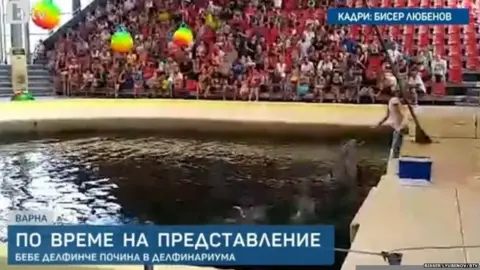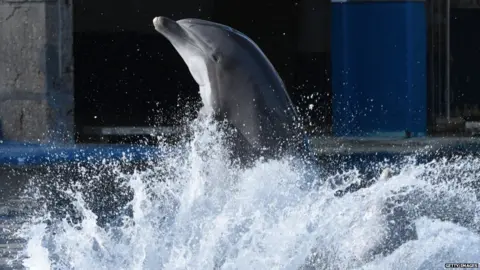Baby dolphin death causes dismay in Bulgaria
 Bisser Lyubenov/BTV
Bisser Lyubenov/BTVThe dolphinarium in the city of Varna on the Bulgarian Black Sea coast has been criticised over the death of a baby dolphin.
The incident happened during a live performance at the aquatic zoo earlier this month, reports BTV Novinite, citing one spectator.
"There was a disturbance, the dolphins stopped playing and performing tricks", remembers Bisser Lyubenov. The show was then cut short, he says, and the visitors asked to leave.
The body of the baby could be seen by visitors in the park's the cafe, according to another distressing account.
But the dolphinarium denies the death occurred during a live show and in front of children as had been reported.
Tsvetan Stanev, the facility's biologist, insists that the baby and its mother had been separated from the other dolphins since the calf was born.
"You can't have a mother leaving its child in order to take part in the show. This can happen about six months after the birth. A baby dolphin taking part in performances nine days after it was born - this has never happened in this dolphinarium!", he says.
Animals 'not surviving here'
But this explanation has not put concerns about the welfare of the animals to rest.
Yavor Gechev from the animal protection organisation Four Paws points out that six animals - five dolphins and a seal - have died at the park over the past five years - a mortality rate, he says, much higher than in other similar marine parks.
 Getty Images
Getty Images"This means categorically that conditions don't meet even the minimal standards for keeping such animals", he insists. "The animals are struggling there, they are not surviving."
The incident sparked outrage on social media and a petition calling for the closure of the park is being circulated.
"I saw the show once and I'm still horrified about the way the dolphins get treated! It's clear that a big profit is made at the expense of the animals who are forced to perform too often," one person wrote on Facebook.
Days after the dolphin death, Four Paws alerted Bulgarian media about another development which further infuriated animal lovers.
A group of lawmakers have reportedly proposed a change in the existing law for the protection of animals, which would make it legal for the two sea lions currently used to "kiss" tourists for photos at the attraction to take part in live shows.
"If shows involving sea lions are allowed to happen, this will be hell for the animals", says Mr Gechev. "Lawmakers need to change the way they think, and consider banning or limiting the existing performances with dolphins instead."
Against the flow
It is now widely recognised that captivity is harmful for cetaceans whose highly intelligent and socially complex nature requires the freedom of the open seas.
With the notable exception of Spain which has a high number of captive dolphins, the prevailing tendency in Europe is towards the closure of such facilities.
In the UK, shows featuring captive dolphins stopped more than 25 years ago, following a highly popular animal rights campaign.
You may also be interested in:
Many societies outside Europe too are rejecting the idea of dolphins being held in captivity. In June, Canada's parliament passed a federal law known as "Free Willy" which bans whales, dolphins and porpoises from being bred or held in marine parks.
In the US, SeaWorld - which banned its controversial orca breeding programme in 2016 - has been recently facing criticism for its treatment of dolphins with speculation growing that it will focus on thrill rides while captive animals will have a diminishing role in its future.
And, in a bold gesture, India didn't simply ban shows involving dolphins back in 2013 - it declared the animals "non-human persons", who should enjoy their own specific rights.
Reporting by Krassi Twigg
Next story: Iranian app bashed for refusing service to women
Use #NewsfromElsewhere to stay up-to-date with our reports via Twitter.
